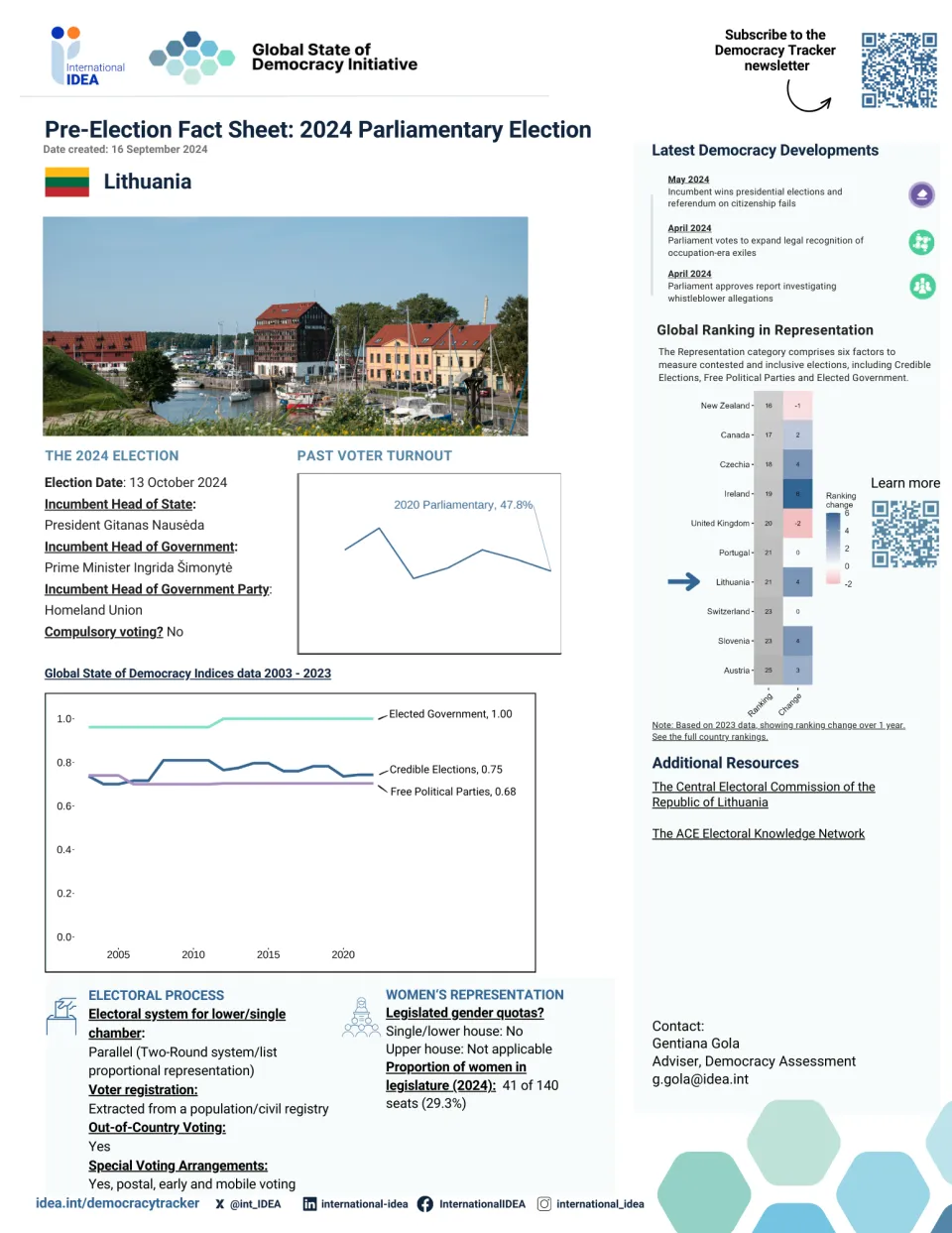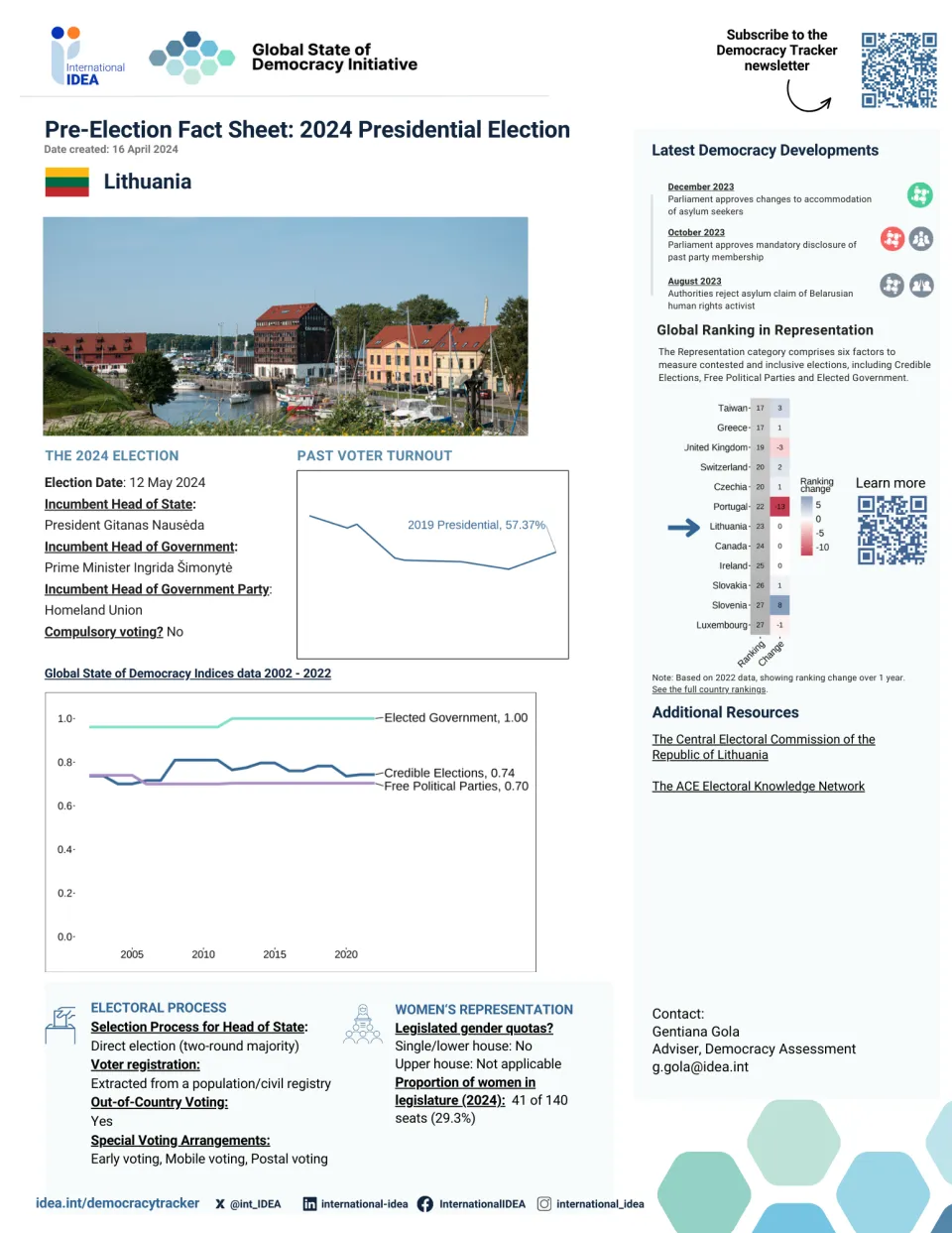
Lithuania
Lithuania performs in the high range in Representation and Rights, and exhibits mid-range performance in Rule of Law and Participation of the Global State of Democracy (GSoD) framework. It falls amongst the top 25 per cent of performers at the global level in nearly all factors, except for Civic Engagement and Electoral Participation. Between 2018-2023, Lithuania has registered notable improvements in Economic Equality and no significant declines. Lithuania is a high-income economy with a robust services sector, though faces labour shortages due to high levels of emigration.
Lithuania was established in 1236, after local fiefdoms were united under Grand Duke Mindaugas. The country has been occupied by foreign powers for much of the past century, and experienced repression under the Russian empire until the end of World War I, and later by Nazi Germany and the Soviet Union. Lithuania declared independence from the Soviet Union in 1990. The country has a relatively ethnically homogenous population, with national minorities including 6.4 per cent Poles and 5.1 per cent ethnic Russians. Despite overall political stability, trust in political parties remains low in Lithuania and there have been instances of political corruption, including a case which culminated in the impeachment of its president in 2004, as well as a 2023 municipal expenses scandal. These factors have contributed to growing voter apathy, and the country has seen consistently low voter turnout in recent elections.
Due to Lithuania’s geographical position bordering Russia and Belarus, political debate is often coloured by national security concerns. The country has been under strain from what the Foreign Ministry has termed the weaponization of migration by Belarus, prompting the Lithuanian government to tighten border security and erect a border fence. Against a background of social fragmentation, Lithuania struggles to accommodate migrants and fewer Lithuanians consider active promotion of immigrant integration to be necessary compared to EU averages. The Lithuanian government has also enacted tougher migration measures, including controversial 2023 amendments legalizing migrant “pushbacks” - a policy determined to be unlawful by the EU Court of Justice in June 2022. Unlike other Baltic states, the Church retains a high level of influence in Lithuania, and as much as four-fifths of the population is Roman Catholic. Religious authorities have been vocal in resisting the legal recognition of same-sex partnerships. Lithuania defines marriages as between a man and a woman in its Constitution.
Nevertheless, Lithuania has consistently been a high performer in Gender Equality. The emergence of Lithuania’s first female-led government and increasing women’s representation at the ministerial level in recent years have been notable. However, the gender pay gap remains a pronounced challenge, as well as gaps in labour force participation and bank account ownership between men and women.
Going forward, it will be important to watch how the government addresses concerns about migration with potential impacts on Rights. Particular attention should be paid to recent legislative amendments to protect the freedom of movement of migrants in accommodation facilities, as well as a class action law suit filed by migrants against Lithuania in 2024. It will also be important to observe a government proposal to strip people deemed a threat to national security of their Lithuanian citizenship for possible impacts on Rights. At the same time, it will be critical to monitor the fight for marriage equality, as Parliament considers proposals to recognise same-sex civil unions. Absence of Corruption should be watched closely, especially as the Council of Europe’s corruption monitoring body has noted recent steps to prevent corruption in law enforcement agencies.
Last updated: September 2024
https://www.idea.int/democracytracker/
January 2025
New law guaranteeing rights of national minorities enters into force
On 1 January, a new Law on National Minorities entered into force, 15 years after the previous law on national minorities expired in 2010. Parliament approved the new law in November 2024 with 67 votes in favour and four abstentions. Lithuania is home to around 432,000 members of national minorities according to a 2021 census, including Poles, Russians, Belarusians, Ukrainians, Jews, Tatars and Roma, among others. The law guarantees national minorities can use their languages without restriction in private and public life, including to receive education and to disseminate information via mass media in their languages. The law also provides for the right to form political organizations and establishes the Council of National Minorities to represent the interests of national minorities in cultural, social and economic issues.
Sources: LRT (1), LRT (2), Department of National Minorities (1), Department of National Minorities (2), Council of Europe, Seimas
December 2024
Religious association receives long-awaited state recognition
On 12 December, Parliament voted to officially recognize Romuva, a pagan religious association. The status of a state-recognized religious association gives the right for Romuva ministers to perform religious marriages with the same effect as civil marriages, the right to broadcast its religious services, the right to provide religious education in schools, as well as an exemption from the payment of land tax. Similar legislation had failed to pass Parliament on several occasions, most recently in 2023. In 2021, the European Court of Human Rights (ECHR) found the Parliament’s previous refusal to recognize the association violated Romuva rights, and concluded that the MPs who voted against state recognition had failed to remain neutral and impartial in the exercise of their powers. There are around 3,917 Lithuanians identifying as Romuva according to the 2021 national census.
Sources: Seimas, LRT, ECHR (1), ECHR (2), Romuva, International Journal for Religious Freedom
Constitutional Court finds limits on LGBTQIA+ content for minors unconstitutional
On 20 December, the Constitutional Court annulled a provision of the Law on the Protection of Minors (adopted in 2009) limiting the spread of public information “expressing contempt for family values” that was used to restrict content about same-sex relationships. The Court found the provision violated parts of the Constitution relating to freedom of expression (Article 25) and the right to family life (Article 38). The ruling found the provision narrowed the concept of the family, citing the duty of the state to ensure children’s development is based on the “values of equality, pluralism, and tolerance.” The Justice Ministry asked the Constitutional Court to review the law following a 2023 ruling of the European Court of Human Rights, which found a violation of author Neringa Macatė’s right to freedom of expression, after the distribution of her children’s books depicting same-sex couples was restricted under the law.
Sources: JURIST, LRT, ECHR, Constitutional Court, LGL
Court legally recognizes same-sex parenthood
On 6 December, a Vilnius District Court ruling that recognized Jūratė Juškaitė as the mother of a child born to her partner came into effect. The decision, reached on 6 November, makes it possible for Juškaitė to request Vilnius municipality’s civil registry to list her as the child’s mother in official documents, and marks the first time a same-sex partner has secured the legal status of parenthood. Legal parenthood entails the right to parental leave, inheritance rights for the child, as well as the right to act as the child’s legal representative, which for example enables Juškaitė to seek medical care for her child without the need for special authorization. Lithuania does not legally recognize same-sex partnerships, and draft legislation recognizing same-sex partnerships has struggled to gain sufficient support in Parliament.
Sources: LRT, Baltic Times, 15min, TV3
November 2024
Outcry against inclusion of party with antisemitic links in government
On 11 November, the Social Democratic Party of Lithuania signed a coalition agreement including the Nemunas Dawn party, which placed third in the October parliamentary elections. In April, the Constitutional Court found the Nemunas Dawn party’s leader, Remigijus Žemaitaitis, violated the Constitution over antisemitic public statements. He resigned from Parliament in April rather than face an impeachment vote and is currently being investigated for inciting hatred against Jewish people. Thousands of people demonstrated in Vilnius, calling for zero tolerance to antisemitism. In parallel, 30 civil society organisations signed an open letter calling for Nemunas Dawn to be left out of the new coalition, initiated by the European Movement and the Lithuanian Center for Human Rights.
Sources: International IDEA, LRT (1), LRT (2), Reuters, JURIST, Constitutional Court
October 2024
Opposition Social Democratic Party wins parliamentary election

Lithuania held legislative elections for the 141-seat Seimas, with the first round on 13 October and a run-off on 27 October. The Social Democratic Party (LSDP) won 52 seats (19.3 per cent of the vote share), surpassing the incumbent Homeland Union-Christian Democrats of Lithuania (TS-LKD), which secured 28 seats (18.0 per cent of the vote). The Nemunas Dawn party came in third with 20 seats (15.0 per cent of the vote). Voter turnout was 52.18 per cent in the first round and 41.41 per cent in the run-off, up from 47.80 per cent (first round) and 39.24 per cent (run-off) in the 2020 elections. Women’s representation in the new legislature fell from 29.3 per cent to 27.7 per cent.
Sources: IFES, IPU, VRK, LRT (1), LRT (2), International IDEA, Made in Vilnius, Politico
See all event reports for this country
Global ranking per category of democratic performance in 2023
Basic Information
Human Rights Treaties
Performance by category over the last 6 months
Election factsheets
Global State of Democracy Indices
Hover over the trend lines to see the exact data points across the years
Factors of Democratic Performance Over Time
Use the slider below to see how democratic performance has changed over time

